Mental fatigue in athletes can significantly hinder performance and increase injury risk. Recognising symptoms like decreased motivation and impaired concentration is essential. Understanding the causes, including prolonged mental exertion and stress, helps in identifying effective recovery strategies. Implementing techniques such as structured rest and mindfulness can promote mental resilience and enhance overall performance.
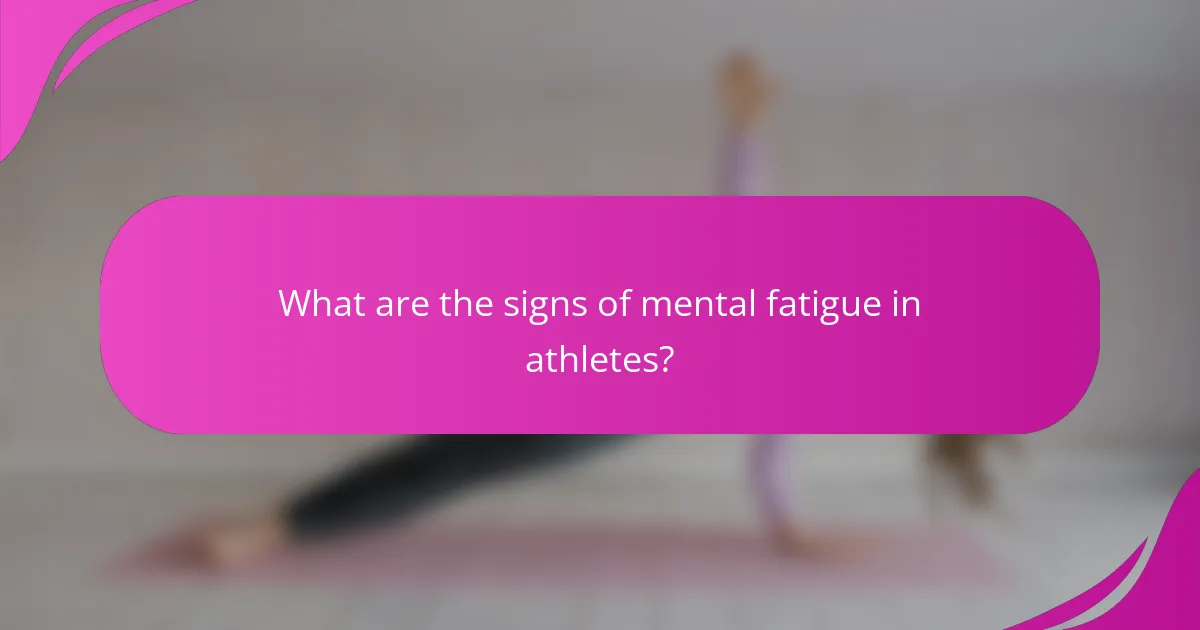
What are the signs of mental fatigue in athletes?
Signs of mental fatigue in athletes include decreased motivation, impaired concentration, and increased irritability. These symptoms can lead to reduced performance and heightened risk of injury. Athletes may also experience sleep disturbances and emotional exhaustion. Recognising these signs early is crucial for implementing effective recovery strategies.
How does mental fatigue manifest during training and competition?
Mental fatigue in athletes manifests as decreased concentration, slower reaction times, and heightened irritability. These symptoms can hinder performance during training and competition. Research indicates that mental fatigue can reduce endurance and increase perceived effort, impacting overall athletic output. Identifying these signs early is crucial for implementing effective recovery strategies, such as rest and mental recovery techniques.
What physical symptoms accompany mental fatigue?
Mental fatigue can lead to various physical symptoms in athletes, including headaches, muscle tension, and increased heart rate. These symptoms stem from the body’s stress response, impacting performance and recovery. Recognising these signs is crucial for effective management and recovery strategies.
How can athletes identify cognitive signs of mental fatigue?
Athletes can identify cognitive signs of mental fatigue through various symptoms such as decreased concentration, slower reaction times, and increased irritability. Recognising these signs is crucial for maintaining performance and mental health. Mental fatigue often results from prolonged training or competition without adequate recovery. Athletes should monitor their mental state regularly and seek strategies to manage fatigue, such as rest, proper nutrition, and mental exercises.
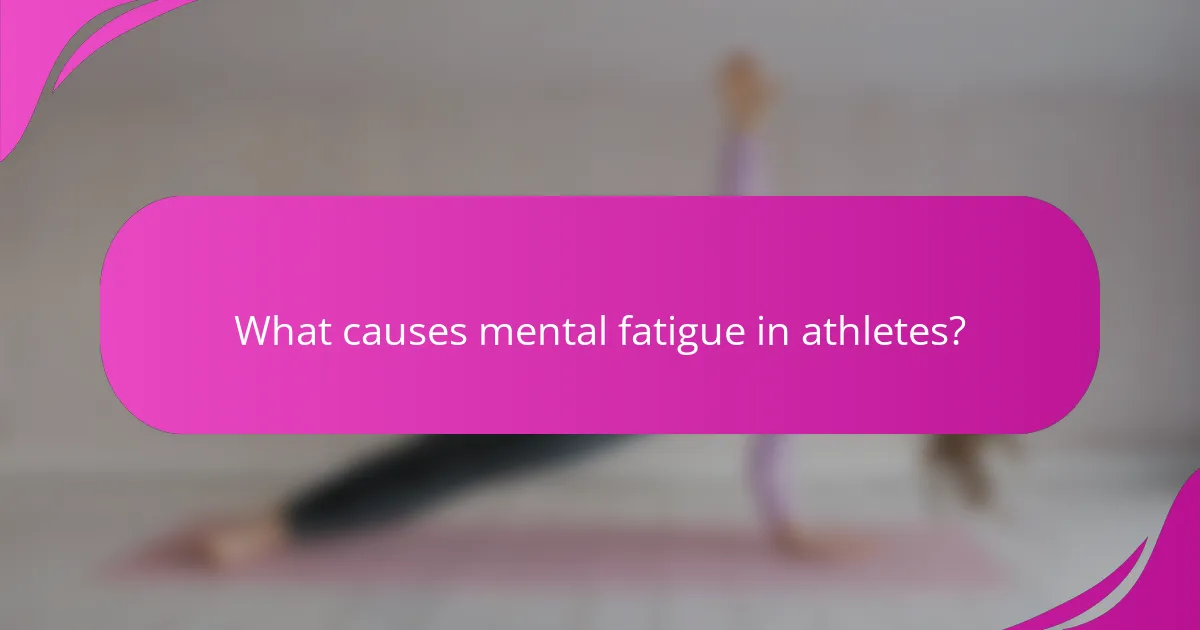
What causes mental fatigue in athletes?
Mental fatigue in athletes is primarily caused by prolonged mental exertion, stress, and lack of recovery. Symptoms include decreased concentration, irritability, and diminished performance. Contributing factors involve intense training schedules, competition pressure, and inadequate sleep. Recovery strategies focus on mental rest, relaxation techniques, and balanced training regimens.
How do training loads contribute to mental fatigue?
Training loads significantly contribute to mental fatigue in athletes by increasing stress and cognitive demands. High training volumes can lead to exhaustion, reduced focus, and impaired decision-making. Over time, this mental strain may result in a decline in performance and motivation. Athletes should monitor their training loads and incorporate recovery strategies to mitigate these effects. Regular rest, proper nutrition, and mental conditioning can enhance resilience against mental fatigue.
What role does stress play in mental fatigue for athletes?
Stress significantly contributes to mental fatigue in athletes by impairing focus and decision-making. High levels of stress can lead to increased anxiety, reduced motivation, and overall mental exhaustion. Research indicates that chronic stress disrupts cognitive functions, making it challenging for athletes to maintain optimal performance levels. Recovery strategies, such as mindfulness and relaxation techniques, can mitigate these effects and enhance mental resilience.
How do sleep patterns affect mental fatigue levels?
Sleep patterns significantly impact mental fatigue levels by influencing cognitive function and recovery. Irregular sleep schedules can lead to increased fatigue, affecting athletes’ performance. Studies show that athletes with consistent sleep patterns report lower mental fatigue and improved focus. Prioritising quality sleep can enhance recovery and reduce fatigue symptoms.
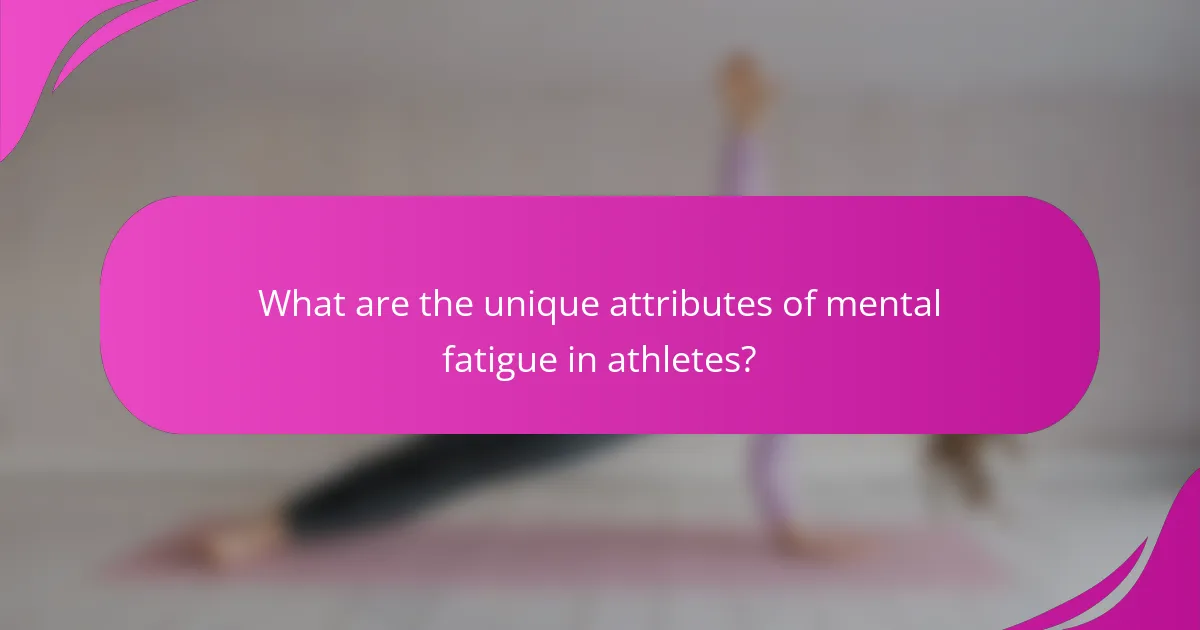
What are the unique attributes of mental fatigue in athletes?
Mental fatigue in athletes is characterised by decreased motivation, impaired concentration, and increased perception of effort. Unique attributes include emotional exhaustion, cognitive overload, and reduced performance efficiency. These symptoms often stem from prolonged training, competition stress, and insufficient recovery. Recognising these signs early can aid in implementing effective recovery strategies.
How does mental fatigue differ from physical fatigue?
Mental fatigue differs from physical fatigue in that it primarily affects cognitive functions rather than physical performance. Mental fatigue can manifest as decreased focus, irritability, and reduced motivation, while physical fatigue results in muscle weakness and exhaustion. Both types of fatigue can impact athletic performance, but their recovery strategies differ. Mental fatigue often requires mental rest, relaxation techniques, and cognitive breaks, whereas physical fatigue typically necessitates physical rest, nutrition, and hydration. Recognising these differences is crucial for athletes to implement effective recovery strategies tailored to their needs.
What are the psychological impacts of prolonged mental fatigue?
Prolonged mental fatigue can lead to significant psychological impacts, including decreased motivation, increased anxiety, and impaired cognitive function. Athletes may experience mood swings and diminished performance due to these effects. Research indicates that mental fatigue can reduce focus and decision-making abilities, essential for athletic success. Addressing mental fatigue with proper recovery strategies is crucial for maintaining mental health and performance.
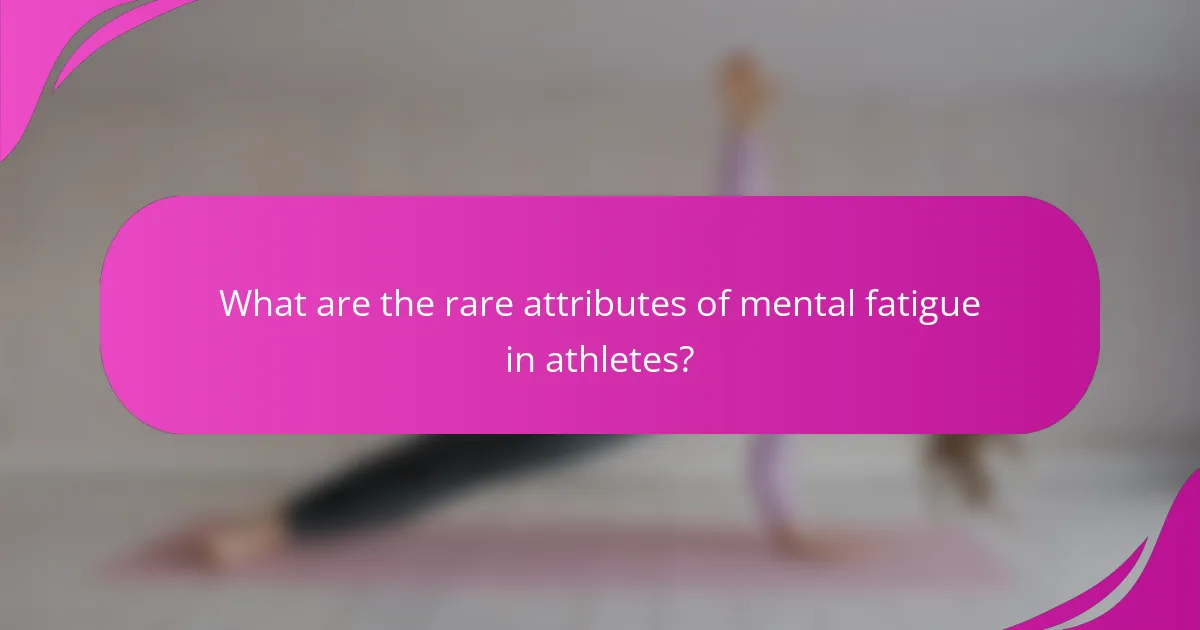
What are the rare attributes of mental fatigue in athletes?
Rare attributes of mental fatigue in athletes include decreased cognitive flexibility, impaired decision-making under pressure, and heightened emotional sensitivity. These attributes are less commonly recognised but significantly impact performance. Athletes may experience difficulty in adapting strategies quickly and may react more strongly to stressors. Recognising these rare signs can aid in developing effective recovery strategies.
How can mental fatigue vary among different sports?
Mental fatigue can vary significantly among different sports due to the unique demands each sport places on athletes. Endurance sports, like marathon running, often lead to prolonged mental fatigue because of the extended duration of focus and physical exertion. In contrast, sports requiring quick decision-making, such as basketball, may induce mental fatigue from rapid cognitive processing and situational awareness.
Team sports can also contribute to mental fatigue through the social dynamics and communication required, while individual sports may lead to isolation-related fatigue. Recovery strategies differ; endurance athletes may benefit from active recovery techniques, while team sport athletes might focus on mental resilience training. Understanding these variations helps in tailoring recovery strategies for optimal performance.
What are the long-term effects of untreated mental fatigue?
Untreated mental fatigue can lead to chronic stress, decreased performance, and potential burnout in athletes. Long-term effects may include impaired cognitive function, mood disturbances, and increased risk of injuries. Athletes may experience reduced motivation, concentration issues, and emotional instability. As a result, recovery strategies must address both physical and mental health to restore optimal performance.
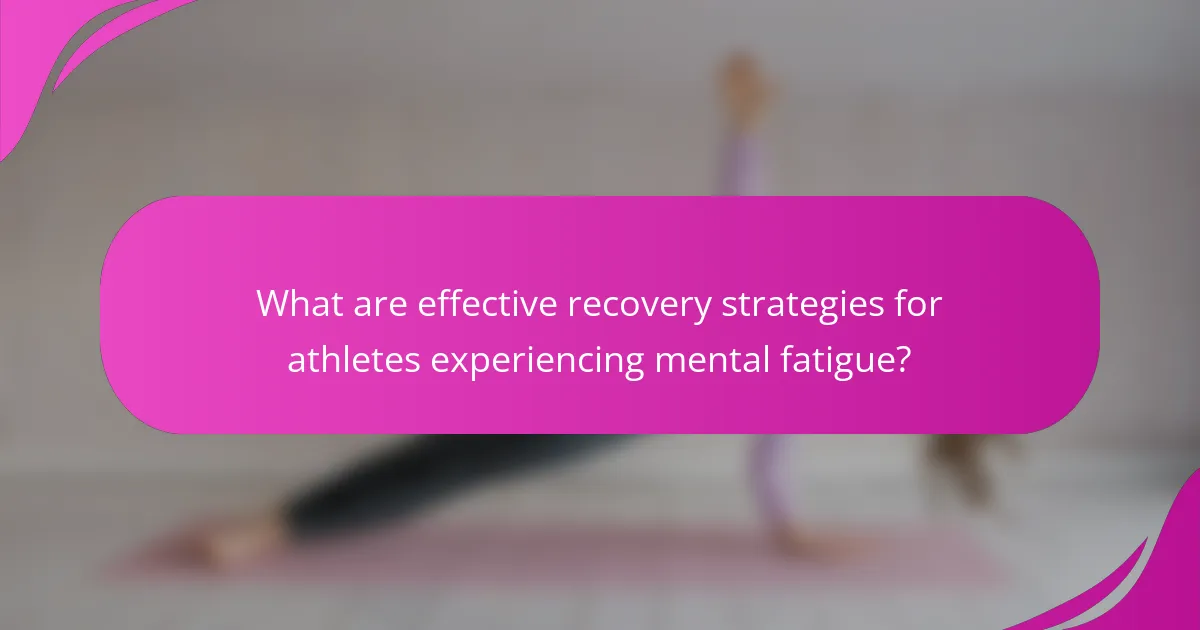
What are effective recovery strategies for athletes experiencing mental fatigue?
Effective recovery strategies for athletes experiencing mental fatigue include structured rest, mindfulness practices, and social support. Prioritising sleep enhances cognitive function, while mindfulness techniques reduce stress. Engaging with teammates fosters a supportive environment that promotes mental resilience.
How can athletes incorporate rest and recovery into their training?
Athletes can incorporate rest and recovery into their training by recognising signs of mental fatigue. These signs include decreased motivation, irritability, and difficulty concentrating. Understanding these symptoms allows athletes to implement effective recovery strategies, such as scheduled rest days and mindfulness practices. Prioritising recovery enhances performance and reduces the risk of burnout.
What role does nutrition play in mental recovery?
Nutrition plays a crucial role in mental recovery by providing the necessary nutrients to support cognitive function and emotional well-being. A balanced diet rich in omega-3 fatty acids, antioxidants, and vitamins can reduce symptoms of mental fatigue in athletes. For example, omega-3s found in fish have been linked to improved mood and cognitive performance. Proper hydration also enhances concentration and reduces fatigue. As a result, focusing on nutrition can significantly aid in the recovery process after intense training or competition.
What mental strategies can help combat fatigue?
Mental strategies to combat fatigue include mindfulness techniques, structured rest, and goal setting. Mindfulness can enhance focus and reduce stress, while structured rest allows for recovery without burnout. Setting specific, achievable goals helps maintain motivation and direction, preventing feelings of overwhelming fatigue.
How does mindfulness practice benefit recovery?
Mindfulness practice significantly benefits recovery by reducing mental fatigue in athletes. It enhances focus, promotes emotional regulation, and fosters resilience. Studies show mindfulness can lower stress levels, improving overall mental well-being, which is crucial for effective recovery. Regular practice leads to better sleep quality and increased self-awareness, both essential for athletes facing mental fatigue.
What are the best practices for mental conditioning?
To optimise mental conditioning, athletes should prioritise rest, maintain a balanced diet, and incorporate mindfulness practices. Recognising signs of mental fatigue is crucial for effective recovery. Strategies include setting realistic goals, monitoring stress levels, and seeking social support. Regularly assessing mental state enhances overall performance and well-being.
What common mistakes should athletes avoid during recovery?
Athletes should avoid neglecting mental health, overtraining, ignoring nutrition, skipping rest days, and failing to communicate with coaches. These mistakes can hinder recovery and prolong mental fatigue. Prioritising mental well-being is crucial for optimal performance.
How can athletes optimise their routine for mental resilience?
Athletes can optimise their routine for mental resilience by implementing specific strategies. Recognising signs of mental fatigue, such as decreased motivation, irritability, and difficulty concentrating, is crucial. These symptoms often arise from intense training or competition stress.
To enhance mental resilience, athletes should prioritise recovery strategies, including structured rest periods, mindfulness practices, and regular sleep schedules. Incorporating mental skills training, such as visualization and positive self-talk, can also significantly improve their mental fortitude.
As a result, athletes can better manage stress and maintain peak performance levels. Engaging in social support networks further aids recovery and fosters a positive mindset.